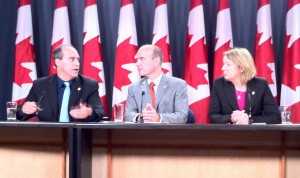Western premiers continue to strike back at Thomas Mulcair, refuting his assertion that they are simply “Harper’s messengers,” while he sticks to his guns on the “Dutch disease” diagnosis, calling it “irrefutable.” Erm, except more economic data shows that it’s not. An IRPP study shows that while there may have been a mild case of said “disease,” it’s a far more complex picture than simply Alberta versus Ontario’s manufacturing sector, as the decline in the manufacturing sector has more to do with the rise of China than it does with the strength of our dollar, which has in turn helped other sectors of the economy as well. Meanwhile, Statistics Canada reports that the manufacturing sector is rebounding. Not that we should expect Mulcair to back down from his position anytime soon.
It seems that the F-35s were built with no cybersecurity protections in them, making them as vulnerable to cyberattacks as Humvees were to roadside bombs, apparently. But these are still the best aircraft that our airmen and women need, remember! Meanwhile, the government sent the RCMP on a five-month probe into what they thought might have been leaked documents after a Globe and Mail story on the F-35s, which turned out to be nothing. Well, nothing but a warning that if the government doesn’t like what the media is reporting, they’ll read too much power into certain National Security Acts that don’t really apply and send the RCMP after them.

